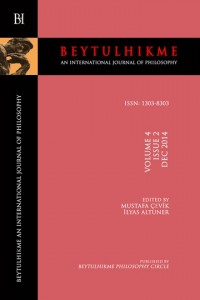Abstract
Phenomenal consciousness, which is philosophical mystery in a lot of ways, is one of the most central problems of contemporary philosophy of mind. In the analytic tradition, the materialist/physicalist approach has been the dominant approach to understanding the nature of phenomenal consciousness. The first thesis of this paper is that “phenomenal subject,” along with the qualitative character, is the other essential element of phenomenal consciousness. Based on this thesis, the paper aims to put forward and justify the following two claims about the ontological status of phenomenal subjects and the possible reactions of the materialist/physicalist thesis to this status: (1) Phenomenal subjects are not ontologically vacant; rather they substantially exist, and (2)this ontological substantiality causes materialism to face an inevitable dilemma: The substantial existence of phenomenal subjects either must be explained away in materialist/physicalist terms as it is attempted to in the case of other mental items, or the substantial existence in question must be denied. On both options, materialist view is closer to fail than to succeed.
Keywords
References
- Arıcı, M. (2011). Physicalism and the Phenomenal-Physical Gap: Can A Posteriori Necessary Physicalism Adequately Respond to the Problem of Phenomenal Subjecthood? PhD Thesis. Ankara: Orta Doğu Teknik Üniversitesi Sosyal Bilimler Enstitüsü.
- Hume, D. (1969). A Treatise of Human Nature (ed. E. C. Mossner). London: Penguin Books.
- Nagel, T. (1974). What Is It Like to Be a Bat? Philosophical Review, 83, 435-50.
- Levine, J. (1983). Materialism and Qualia: The Explanatory Gap. Pacific Philosophical Quarterly, 64, 354-61.
- Levine, J. (1999). Conceivability, Identity and the Explanatory Gap. Towards a Science of Consciousness: The Third Tuscon Discussions and Debates (eds. S. Hameroff & A. Kaszniak & D. Chalmers). Cambridge, MA: The MIT Press.
- Levine, J. (2007). Phenomenal Concepts and the Materialist Constraint. Phenomenal Concepts and Phenomenal Knowledge: Essays on Consciousness and Physicalism (eds. T. Alter & S. Walter). New York: Oxford University Press.
- Rosenthal, D. M. (1997). A Theory of Consciousness. The Nature of Consciousness (eds. N. Block & O. Flanagan & G. Güzeldere), 597-616. Cambridge, MA: The MIT Press.
- Russell, B. (1910). Knowledge by Acquaintance and Knowledge by Description. Proceedings of the Aristotelian Society, 11, 108-28.
Abstract
Phenomenal consciousness, which is philosophical mystery in a lot of ways, is one of the most central problems of contemporary philosophy of mind. In the analytic tradition, the materialist/physicalist approach has been the dominant approach to understanding the nature of phenomenal consciousness. The first thesis of this paper is that “phenomenal subject,” along with the qualitative character, is the other essential element of phenomenal consciousness. Based on this thesis, the paper aims to put forward and justify the following two claims about the ontological status of phenomenal subjects and the possible reactions of the materialist/physicalist thesis to this status: (1) Phenomenal subjects are not ontologically vacant; rather they substantially exist, and (2)this ontological substantiality causes materialism to face an inevitable dilemma: The substantial existence of phenomenal subjects either must be explained away in materialist/physicalist terms as it is attempted to in the case of other mental items, or the substantial existence in question must be denied. On both options, materialist view is closer to fail than to succeed.
References
- Arıcı, M. (2011). Physicalism and the Phenomenal-Physical Gap: Can A Posteriori Necessary Physicalism Adequately Respond to the Problem of Phenomenal Subjecthood? PhD Thesis. Ankara: Orta Doğu Teknik Üniversitesi Sosyal Bilimler Enstitüsü.
- Hume, D. (1969). A Treatise of Human Nature (ed. E. C. Mossner). London: Penguin Books.
- Nagel, T. (1974). What Is It Like to Be a Bat? Philosophical Review, 83, 435-50.
- Levine, J. (1983). Materialism and Qualia: The Explanatory Gap. Pacific Philosophical Quarterly, 64, 354-61.
- Levine, J. (1999). Conceivability, Identity and the Explanatory Gap. Towards a Science of Consciousness: The Third Tuscon Discussions and Debates (eds. S. Hameroff & A. Kaszniak & D. Chalmers). Cambridge, MA: The MIT Press.
- Levine, J. (2007). Phenomenal Concepts and the Materialist Constraint. Phenomenal Concepts and Phenomenal Knowledge: Essays on Consciousness and Physicalism (eds. T. Alter & S. Walter). New York: Oxford University Press.
- Rosenthal, D. M. (1997). A Theory of Consciousness. The Nature of Consciousness (eds. N. Block & O. Flanagan & G. Güzeldere), 597-616. Cambridge, MA: The MIT Press.
- Russell, B. (1910). Knowledge by Acquaintance and Knowledge by Description. Proceedings of the Aristotelian Society, 11, 108-28.
Details
| Primary Language | Turkish |
|---|---|
| Journal Section | Articles |
| Authors | |
| Publication Date | December 30, 2014 |
| Published in Issue | Year 2014 Volume: 4 Issue: 2 |

